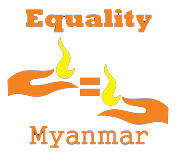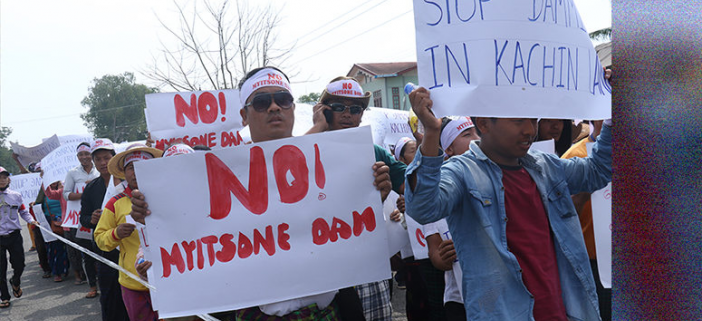By Nan Lwin 23 September 2020
YANGON—China’s state-run media have accused Western organizations of helping local NGOs in Myanmar and elsewhere in Southeast Asia mount anti-China campaigns and oppose China-backed projects under the guise of promoting human rights and democracy.
On Tuesday, the Global Times, which is put out by Chinese Communist Party mouthpiece the People’s Daily, said some NGOs in Southeast Asia have become “vehicles for Western propaganda and even engage in China-bashing campaigns,” adding that such activities were far outside their purview of advancing the public good.
It said that among Southeast Asian countries, Myanmar’s tumultuous political situation had for years created a “paradise” for Western NGOs. Quoting a Chinese person surnamed Zhao in Naypyitaw, the capital of Myanmar, the Global Times claimed local NGO staff played a role in discrediting China-aided or invested infrastructure projects by releasing reports that were critical of them.
The Global Times also quoted Zhu Zhenming, a professor at the Yunnan Academy of Social Sciences, who accused Western NGOs of using various tools to criticize China including stirring up public anger among local residents to reject China-initiated projects due to “environmental concerns.”
The news outlet alleged that the National Endowment for Democracy (NED), an independent nonprofit foundation, had been funding NGOs in Myanmar to oppose Chinese development projects.
The Global Times claimed that the Rakhine State-based Shwe Gas Movement (SGM), with the help of funding from NED, had been “active in attacking Chinese-Myanmar cooperative developments including a crude oil and gas pipeline project,”
SGM is a community-based organization in Rakhine campaigning against the Shwe Gas Project and China’s Trans-Burma Pipeline, while promoting human rights, environmental justice and revenue transparency in the oil and gas sector in Myanmar. It has produced a series of reports revealing the ordeals of local people due to the pipeline project, in particular land confiscation, labor abuses, loss of livelihoods and environmental degradation.
SGM cofounder Wong Aung told The Irrawaddy the Global Times’ claim is totally false, adding that the organization had never received financial support from NED.
“We did the reports because people in Rakhine are suffering the effects of the project including human rights abuses and losing their livelihoods. We serve as a bridge for the Rakhine people, as they don’t receive any benefits from the project,” Wong Aung said.
“I want to tell both the Chinese government and the Chinese company [state-owned China National Petroleum Corporation (CNPC)] that we understand responsible investment is essential for the development of Rakhine State. We don’t oppose responsible investment,” Wong Aung added.
In Myanmar, the Chinese twin oil and natural gas pipeline project has been controversial since construction work began on it in 2009, provoking opposition from local communities and environmental organizations. Myanmar’s then ruling military regime signed an agreement on the project with CNPC, which is the main shareholder in the pipelines project, in 2008.
The oil and natural gas pipelines run in parallel for 771 km in Myanmar from the port of Kyaukphyu in Rakhine State on the Bay of Bengal through Magwe and Mandalay regions and northern Shan State before entering China. A series of protests have been held along the route in Rakhine, Shan and Magwe due to concerns over safety, as the route passes through farms and near homes. Protesters have demanded fair compensation for loss of land and livelihood.
Responding to the Chinese media’s accusations, the executive director of Equality Myanmar, U Aung Myo Min, told The Irrawaddy that NGOs by their nature rely on foreign aid and other donors. However, he said, “We are not puppets. We stand up for the needs of the people.”
He said the majority of natural resources exploitation and environmental destruction in Myanmar were caused by mega investments backed by Chinese companies, not by Western companies.
“That’s why they [the Chinese]are receiving the most criticism [from local NGOs]. It has nothing to do with [China itself],” he said.
“Our position is to uphold human rights and to stand up for the truth by listening to the voices of oppressed people,” he added.


 Equality Myanmar (EQMM) is a leading nongovernmental organization that organises a wide range of human rights education and advocacy programs, the documentation human rights violations, and provides emergency support for activists, human rights defenders, and their families. We work with a range of local civil society organizations, educators, activists, various local actors, and our programs and activities reach all states and regions in Myanmar.
Equality Myanmar (EQMM) is a leading nongovernmental organization that organises a wide range of human rights education and advocacy programs, the documentation human rights violations, and provides emergency support for activists, human rights defenders, and their families. We work with a range of local civil society organizations, educators, activists, various local actors, and our programs and activities reach all states and regions in Myanmar.